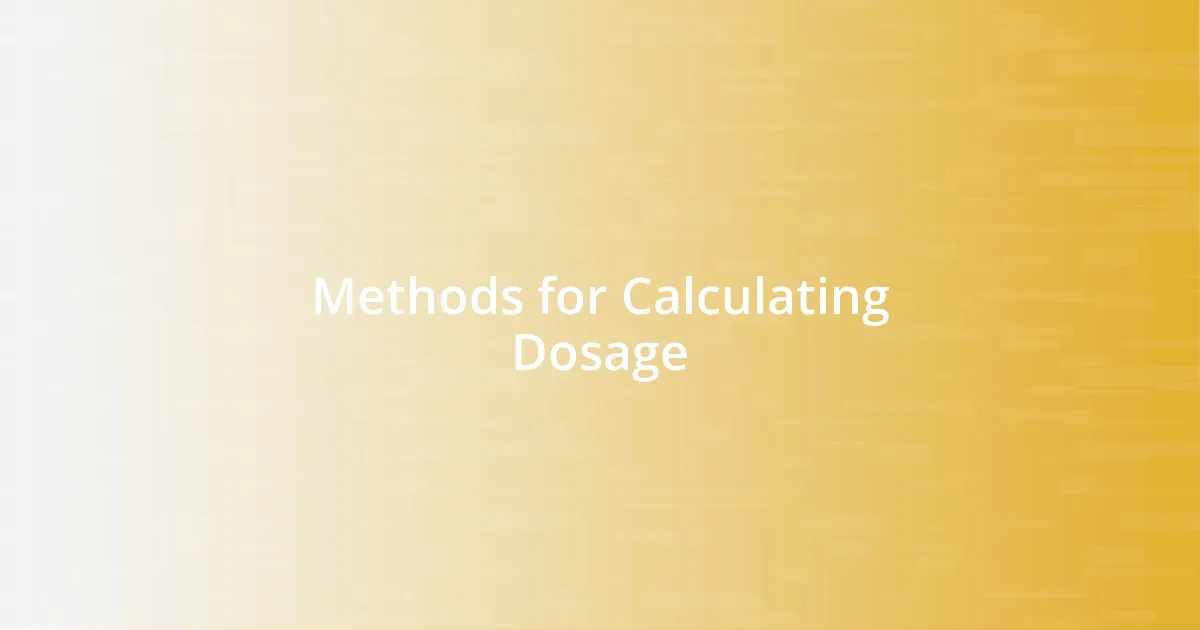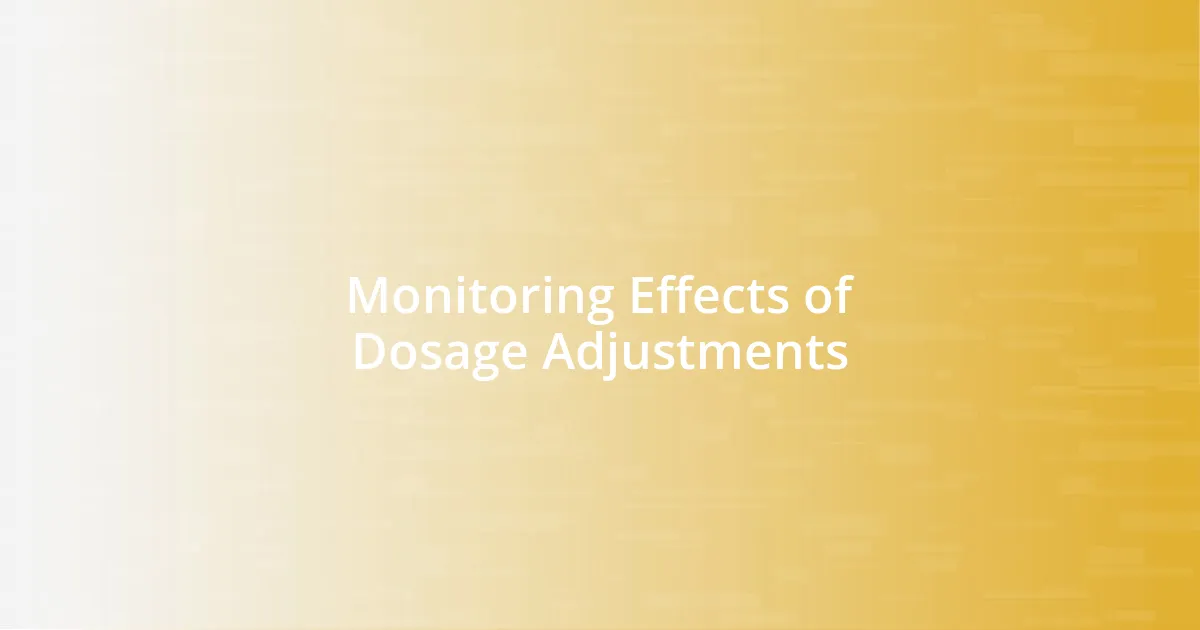Key takeaways:
- Determining ideal dosage is a personal journey, influenced by individual biology, emotional state, and lifestyle choices.
- Keeping a reflective journal helps track body responses and adjust dosages based on personal experiences rather than guesswork.
- Gradual adjustments to dosage minimize side effects and allow the body time to adapt, promoting safer changes.
- Regular self-reflection after dosage changes provides clarity and helps in understanding the overall impact on quality of life.

Understanding Personal Dosage Needs
Determining your ideal dosage is a deeply personal journey, shaped by various factors unique to you. Have you ever noticed how your body responds differently each time? For instance, when I first started adjusting my dosage, I felt overwhelmed by the trial-and-error process, but each small change taught me something valuable about my own needs.
It’s crucial to listen to your body and recognize the signs it gives you. I remember a time when I tried increasing my dosage, thinking it would yield better results, only to find myself feeling anxious and off-balance. This experience made me realize that more isn’t always better; sometimes, less can be more effective.
Additionally, external factors like lifestyle, stress levels, and even diet can significantly impact how a dosage affects you. Have you ever considered how your mood fluctuates based on what you’ve eaten or how well you’ve slept? Embracing this holistic view has helped me understand that my ideal dosage is not static; it evolves with my circumstances, reminding me that self-awareness is key in this process.

Factors Influencing Ideal Dosage
When it comes to determining your ideal dosage, several factors play a critical role. One aspect I’ve learned is that personal biology can greatly influence how you react to a given dosage. For instance, some individuals metabolize substances quickly, while others may take longer, leading to different effects. I remember experimenting with dosage strength and discovering that what worked for my friend didn’t work for me at all. These variations in metabolism can often lead to surprises, making it essential to find what works best for you.
Another factor to consider is your emotional state. I’ve noticed that when I’m feeling particularly stressed or anxious, my dosage might need adjustment for optimal effectiveness. There was a time when I neglected my emotional wellbeing while increasing my dosage, resulting in an overwhelming feeling of restlessness instead of calm. This taught me that my mental health is a significant component in determining the most beneficial dosage.
Lastly, lifestyle choices, such as your daily activity level and sleep patterns, can impact your ideal dosage. For example, I once had a particularly busy week where my sleep was compromised. In response, I reduced my dosage slightly to mitigate the risks of side effects from being sleep-deprived. This experience reinforced the idea that our lives are constantly changing, and so too should our approach to dosage.
| Factor | Influence on Dosage |
|---|---|
| Personal Biology | Varies individual responses; requires personal testing |
| Emotional State | Affects optimal effectiveness; may need adjustments |
| Lifestyle Choices | Compromised sleep or activity can lead to dosage changes |

Methods for Calculating Dosage
Calculating your dosage can initially seem daunting, but I found a few methods that really clarified the process for me. I’ve relied heavily on my body’s reactions and noted how I felt during different dosages in a journal. This reflective method allowed me to connect specific experiences with particular dosages, making adjustments based on real feedback rather than guesswork.
Another effective approach is to use a standardized guideline or formula, particularly those based on body weight. I remember applying a common formula for my initial dosage, which helped set a reliable baseline. The following methods are widely recognized for calculating ideal dosage:
- Body Weight Method: Calculate dosage based on your weight (mg/kg).
- Empirical Adjustment: Start with a general starting point, and closely monitor how you feel, making small adjustments.
- Consultation with a Professional: Seek the guidance of a healthcare expert to align your dosage with scientific recommendations.
- Symptom-Based Approach: Adjust based on specific symptoms, aiming for relief rather than a strict dosage target.
I also learned the importance of consistency in monitoring how different doses impacted my daily life. After a week of adjustment, I recall actually sitting down and reflecting on the changes I experienced – the boost in focus, or the odd headaches that crept in at higher doses. By keeping track of these details, I could see a clearer pattern emerge, guiding me toward the dosage that truly suited my needs. Ultimately, the combination of personal introspection and structured methods helped me refine my approach and feel more confident in the decisions I was making about my health.

Monitoring Effects of Dosage Adjustments
Monitoring the effects of dosage adjustments has been a bit of an adventure for me. I vividly remember a time when I decided to tweak my dosage after feeling a bit off. Instead of jumping straight into a higher amount, I opted for a small increase. Over the next few days, I kept a close watch on how my body responded. It was fascinating to see how even a slight change could lead to pronounced differences in my mood and energy levels. Have you ever experienced that? It’s like discovering hidden layers of yourself with every adjustment you make.
Then there were moments I felt inspired to really dive deep into self-reflection post-adjustment. One particular evening, I sat with my journal, pouring out my thoughts and feelings about my experiences with various dosages. Writing down specific instances, like how I felt more engaged during conversations or the instances where anxiety seemed to slip away, helped me connect dots that were otherwise scattered. This practice highlighted the importance of listening to my body and mind as I navigated these changes. I realized it wasn’t just about the numbers; it was about my quality of life.
Sometimes, understanding the nuances of dosage adjustments meant recognizing patterns and triggers. After shifting my dosage one week, I found myself feeling more irritable than usual. I paused, recalling that I had also introduced a new stressor in my life around the same time. This insight made me question whether the dosage alone was the culprit or if other factors were at play. I think that’s a crucial takeaway: it’s essential to consider the bigger picture. Have you ever had a similar realization? That reflection helped me fine-tune my approach and maintain balance, reinforcing how interconnected our experiences truly are.

Guidelines for Safe Dosage Changes
When I began making dosage changes, I quickly learned the importance of gradual adjustments. Sometimes, I would only tweak my dosage by a small fraction, like an extra ten milligrams, and watch closely for any changes. In my experience, this slow and steady approach minimized the potential for side effects and gave my body time to adapt. Have you ever tried something similar? It can be a revealing journey.
I remember the first time I made a more significant shift. I had been feeling stagnant and thought a larger increase would do the trick. However, I felt overwhelmed and anxious within a couple of days. It was a hard lesson for me, illustrating how substantial changes can bring about strong reactions. I realized, then and there, that it’s much safer to listen to my body and proceed cautiously, especially during those periods of adjustment. So, how can we ensure we’re making these changes safely?
Regular check-ins with myself became a non-negotiable part of my routine. I started setting aside time at the end of each week to really reflect on how I felt after each adjustment. This quiet time allowed me to digest my emotions and experiences comprehensively. I would ask myself questions like, “Was the increase worth it?” or “Did my energy levels truly improve?” Those moments not only provided clarity but also made the entire dosing process feel much more manageable. Have you ever taken the time to just sit with your thoughts about your dosage? Trust me, it can yield some surprising insights.















